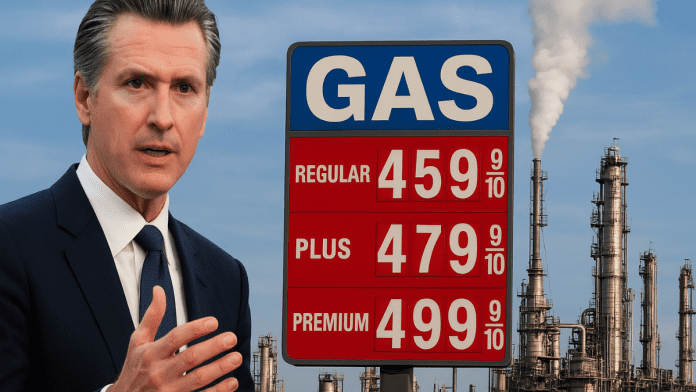🕒 Last updated on September 30, 2025
Just last year, California’s governor spoke strongly against the oil industry. He said that big fuel companies were tricking people and making giant profits while families struggled. He called them harmful to the planet and promised to stand up to them.
A Dramatic Shift in Tone
But now, things have changed in a surprising way.
Gas prices in California are among the highest in the country. Some experts fear that a gallon of gasoline could even reach shocking new levels if more fuel companies shut down or leave the state. This has caused worry among people who drive daily to work or depend on cars for basic needs.
The governor, who is often talked about as a possible future national leader, is feeling the pressure. If fuel prices stay high, it could hurt his image across the country. Critics are blaming him for the crisis, putting up billboards and warning that his rules pushed companies away.
What was once a strong fight against oil companies has now become a careful effort to work with them. Top state officials have even met privately with fuel companies to stop more refinery closures. They are trying to calm the fears of businesses that say strict rules are hurting their profits.
Refineries Close as Prices Rise
California has special fuel rules to reduce air pollution. These rules are meant to make the air cleaner, but they also make fuel more expensive to produce. Added taxes and fees also increase the price per gallon.
In the past two years, the state passed laws to stop fuel companies from making too much profit and to force them to keep extra fuel stored for emergencies. But soon after those rules were signed, one major refinery in Los Angeles announced it would shut down. Another near San Francisco said it would follow.
Together, these closures could remove a huge part of the fuel supply that millions of people depend on. One of the state’s biggest oil pipelines is also losing money and could close soon. This means even less fuel being made inside the state.
With fewer refineries running, California will have to buy more gasoline from other places. But even that is not simple. Ports have strict pollution rules, and companies say they are not yet ready to meet them for increased imports.
Some lawmakers are shocked at how fast things are changing. A few even tried to pay one big refinery hundreds of millions of dollars just to stay open, but that plan has not worked so far. Meanwhile, towns that depended on these refineries for tax money are already planning budget cuts. One small city near the San Francisco Bay has even stopped paying for holiday celebrations because it fears losing its biggest taxpayer.
Quiet Meetings and Rising Tensions
As the situation worsened, the governor sent a message to state regulators asking them to work closely with fuel companies. Meetings were soon held with oil producers, labor unions, and environmental groups behind closed doors.
A long report was created to outline what should be done. In it, officials suggested stopping plans to limit profits at refineries. They also said the state should allow more fuel imports and support more oil drilling inside California.
Trump names Murdoch, Ellison, Dell in social media takeover plan as Newsom warns of censorship
To push these ideas forward, state officials even traveled to Texas to meet fuel company leaders in person. These companies said they would be more willing to stay in California if they could earn steady profits and not be outpriced by cheaper imports.
Some environmental groups were surprised to see how fast lawmakers began listening to the industry. They said fear of rising fuel prices made many politicians change their views almost overnight.
Now, even longtime supporters of clean energy are saying that the state must balance climate goals with real-life needs at the gas pump. More leaders from both sides are calling for cooperation instead of constant fighting.
The situation has become a major test of leadership. As more refinery workers worry about their jobs and more drivers worry about fuel bills, every decision carries heavy weight. For now, the message from the state is simple: fuel must stay affordable—no matter what it takes.

